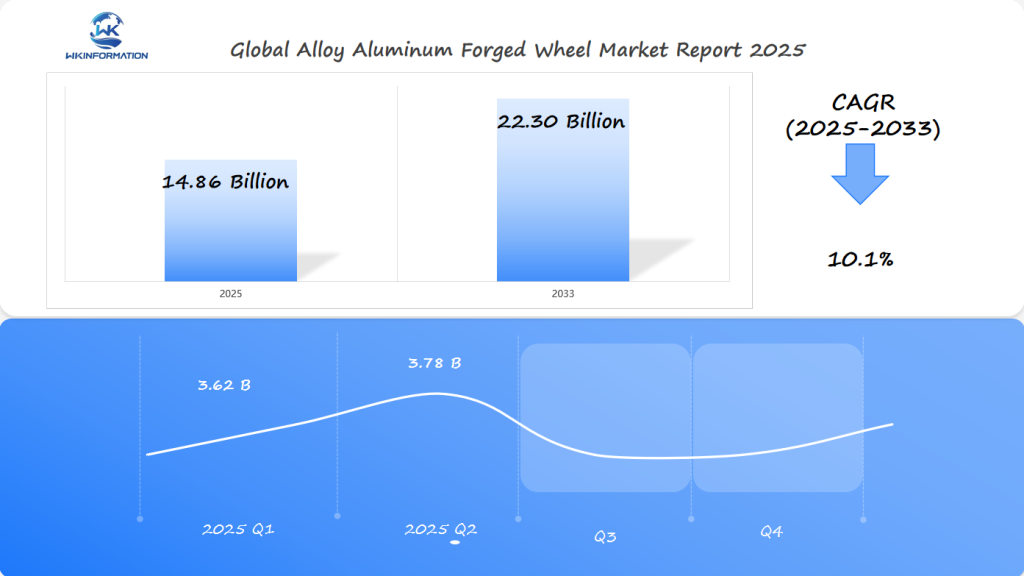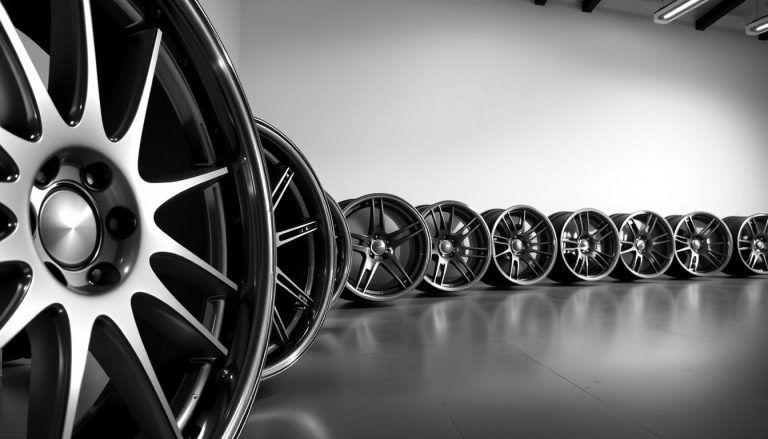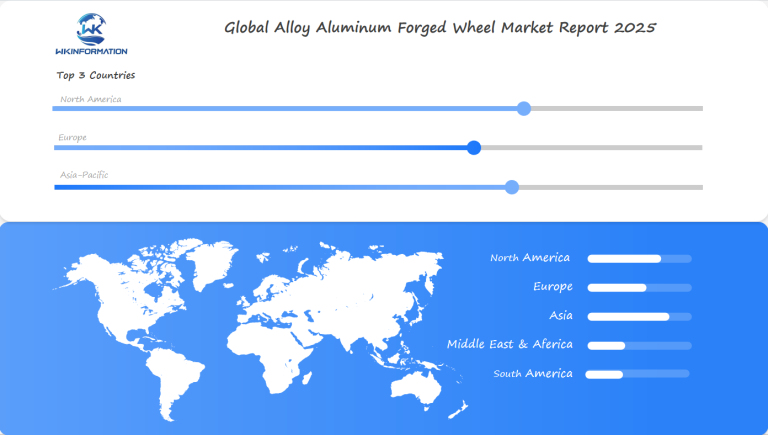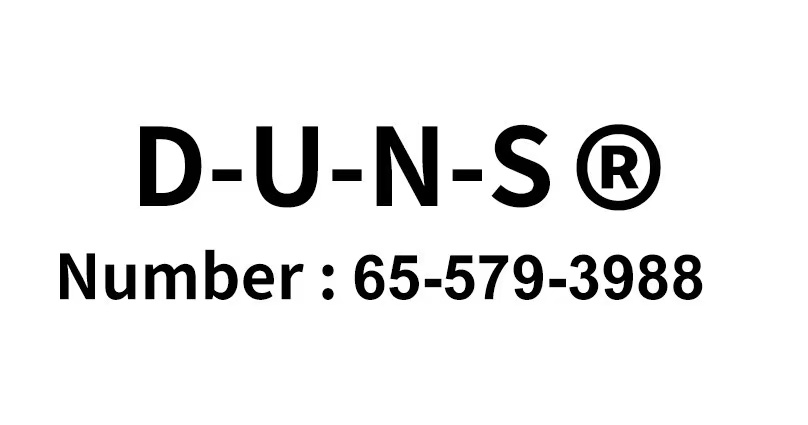Alloy Aluminum Forged Wheel Market: Unlocking $14.86 Billion Growth in US, China, and Germany by 2025
Discover the dynamic alloy aluminum forged wheel market with insights into leading regions like the US, China, and Germany. A comprehensive analysis of market growth, technological advancements, and key manufacturers shaping the industry’s future.
- Last Updated:
Q1 and Q2 Growth Projections for the Alloy Aluminum Forged Wheel Market in 2025
The global alloy aluminum forged wheel market is poised for steady growth, with projections estimating its value at USD 14.86 billion in 2025. Based on historical trends and current demand patterns, Q1 2025 is anticipated to generate revenues of approximately USD 3.62 billion, while Q2 is expected to see a slight uptick to USD 3.78 billion, driven by seasonal demand and increased automotive production.
The United States, China, and Germany stand out as the most critical markets to study, with the U.S. leading in technological advancements, China dominating manufacturing output, and Germany excelling in high-performance automotive applications. These countries are pivotal in shaping the market’s trajectory, offering unique insights into regional dynamics and growth opportunities.For a comprehensive analysis of market trends, competitive landscapes, and future projections, access the Wkinformation Research sample and full report. Discover the key drivers and challenges influencing this evolving industry and stay ahead of the curve.

Upstream and Downstream Industry Chain Analysis: Understanding the Alloy Aluminum Forged Wheel Supply Chain
The alloy aluminum forged wheel industry is a complex web of processes, materials, and new technologies. Knowing the supply chain helps us understand the detailed workings of this specialized field.
Raw Material Suppliers and Their Strategic Impact
Raw materials are the base of the alloy aluminum forged wheel supply chain. Aluminum makers are key in setting the quality and performance of the wheels. Important factors in choosing raw materials include:
- Aluminum purity and metallurgical composition
- Sourcing sustainability
- Cost-effectiveness of material procurement
- Technological capabilities of suppliers
Manufacturing Processes and Technological Advancements
Modern making of alloy aluminum forged wheels has seen big tech changes. New methods like computer-aided design (CAD) and precision forging have made production better and wheels stronger.
Distribution Channels and End-User Industries
The spread of alloy aluminum forged wheels goes through many channels. The main users are car makers. The chain goes through:
- Original Equipment Manufacturers (OEMs)
- Aftermarket suppliers
- Performance automotive segment
- Specialized racing and custom wheel markets
The complex link between suppliers, making processes, and distribution shows the alloy aluminum forged wheel supply chain’s complexity. Growth depends on innovation and teamwork.
Trend Analysis: Current Developments and Future Directions in Alloy Aluminum Forged Wheels
The car world is changing fast, with alloy aluminum forged wheels leading the way. Companies are working hard to make lighter wheels that are better and more efficient. Making lighter wheels is key for car makers to boost vehicle performance.
Lightweight Design and Fuel Efficiency
Car engineers are focusing on making cars lighter to save fuel. Aluminum forged wheels are a big help:
- They can save up to 10% of fuel
- They make cars perform better
- They improve how cars move
Customization and Aesthetics
People want cars that are their own, leading to wheel customization trends. Car makers are coming up with new designs that look good and work well.
The future of car wheels is about being both top-notch and eye-catching.
Integration of Smart Technologies
Smart tech is changing wheel design, adding cool features like monitoring and connectivity. These include:
- Tire pressure monitoring systems
- Real-time performance tracking
- Linking with car systems
The car wheel market keeps growing, thanks to new tech, what people want, and the need for greener cars.
Restriction Analysis: Challenges Facing the Alloy Aluminum Forged Wheel Industry
The alloy aluminum forged wheel industry faces many complex challenges. These challenges shape its competitive landscape. Manufacturers must overcome economic and technological barriers to stay relevant and profitable.
Manufacturers struggle to develop and keep up with competitive wheel production strategies. The industry is under pressure from many factors. These factors affect performance and market position.
Cost Constraints and Price Volatility
Raw material pricing is a big challenge for wheel manufacturers. The global market sees big price swings in aluminum and alloy components. Key factors include:
- Global trade tensions affecting material sourcing
- Tariff impacts on imported aluminum
- Volatility in international metal markets
Regulatory Hurdles and Environmental Concerns
Regulatory hurdles add complexity for wheel manufacturers. Environmental rules demand sustainable production and lower carbon footprints. Manufacturers need to invest in:
- Advanced manufacturing technologies
- Eco-friendly material development
- Compliance with stringent emissions standards
Competition from Alternative Materials
New materials are entering the market, increasing competition. Manufacturers face challenges from materials like:
| Material | Key Advantages | Market Potential |
|---|---|---|
| Carbon Fiber | Lightweight, High Strength | Growing Niche Segment |
| Magnesium Alloys | Exceptional Weight Reduction | Emerging Technology |
| Hybrid Composites | Enhanced Performance | Rapid Innovation |

Geopolitical Analysis: How Global Politics Influence Alloy Aluminum Forged Wheel Production and Trade
The world of alloy aluminum forged wheel production is changing fast. Global politics play a big role in this change. They affect trade policies and supply chains, offering both chances and hurdles for makers.
Recently, global politics have changed how we trade. Because of this, decisions in one country can quickly change things in another. This makes the world of trade very dynamic.
Trade Policies and Tariffs: Economic Battlegrounds
Trade policies have had a big impact on the alloy aluminum forged wheel industry:
- US proposed 25% tariffs on imports from specific countries
- Potential 10% tariff on imports from China
- Increasing focus on reshoring manufacturing capabilities
“Political decisions today can reshape entire industrial ecosystems overnight” – Industry Expert
Regional Economic Agreements: Shifting Partnerships
New economic agreements are forming. Strategic partnerships between countries are key for staying ahead in advanced manufacturing.
Impact of Political Tensions on Global Supply Chains
Uncertainty in politics is making companies build stronger supply chains. They’re spreading out where they get their parts to avoid problems from global conflicts.
- Increased investment in domestic manufacturing
- Development of alternative supply chain networks
- Enhanced focus on technological independence
The alloy aluminum forged wheel industry faces many challenges. It must find a balance between economic benefits and risks from global politics.
Segmentation Type Market Analysis: Alloy Aluminum Forged Wheel Market Segmentation by Vehicle Type
The alloy aluminum forged wheel market is very diverse. It shows how different vehicles have their own needs. By understanding these needs, makers can create wheels that fit each car perfectly.
Looking at vehicle types gives us a clear view of the wheel-making world. There are three main types of vehicles, each with its own set of needs:
Passenger Vehicles: Comfort and Efficiency
Wheels for passenger cars focus on being light and saving fuel. People want them to look good and work well. The key points are:
- Reduced vehicle weight
- Enhanced fuel economy
- Smooth ride quality
- Affordable pricing
Commercial Vehicles: Durability and Load Capacity
Commercial vehicle wheels need to be strong to handle heavy loads. They must also last long and be easy to maintain. The main points are:
- High structural integrity
- Increased load-bearing capacity
- Resistance to wear and tear
- Cost-effective maintenance
Luxury and Performance Vehicles: Precision and Innovation
Luxury and performance cars need top-notch wheels. These markets push for new tech and fancy designs. The main points are:
- Advanced materials
- Precision manufacturing
- Customization options
- Superior aesthetic design
This detailed approach helps makers create wheels that fit each car’s needs. It leads to new ideas and happy customers in the alloy aluminum forged wheel world.
Application Market Analysis: The Role of Alloy Aluminum Forged Wheels in Automotive Performance
Alloy aluminum forged wheels are a big step forward in car performance. They bring big benefits to car design and how cars work. These wheels change how cars are made, making them better in many ways.
Car engineers use these wheels to make cars lighter. This makes cars use less fuel. So, cars go faster and are better for the planet.
Weight Reduction and Fuel Efficiency
- Reduces vehicle weight by up to 22 kg in critical components
- Improves fuel economy through decreased vehicle mass
- Enhances acceleration and energy consumption efficiency
Improved Handling and Braking
Forged aluminum wheels are strong and make cars handle better. They are light, which helps cars turn and stop faster.
Aesthetic Appeal and Brand Differentiation
These wheels also make cars look better. Manufacturers use them to stand out. They make cars look unique and show off the brand’s creativity.
The development of alloy aluminum forged wheels shows the car industry’s focus. They aim to make cars fast, fuel-efficient, and stylish.
Global Alloy Aluminum Forged Wheel Market Region Analysis: A Comparative Study of Regional Dynamics
The global alloy aluminum forged wheel market is complex. It has different regions with their own growth paths. Market dynamics show big differences across the globe. This makes the industry very competitive.
There are three main regions leading in the alloy aluminum forged wheel market:
- North America: Technological innovation hub
- Europe: Sustainability-focused market
- Asia-Pacific: Rapid growth and emerging opportunities
North America: Market Maturity and Innovation
The United States leads in North America. Cutting-edge technological advancements and a strong auto industry push for better wheel designs and making processes.
Europe: Regulatory Landscape and Sustainability Focus
Germany is a big player in Europe. Strict environmental rules push for lighter, greener wheels. The European market focuses on cutting emissions and using new materials.
Asia-Pacific: Rapid Growth and Emerging Opportunities
China is expected to grow fast. The region has a lot of potential in making and innovation.
The global alloy aluminum forged wheel market is set to hit $22.29 billion by 2033. This shows how key it is to understand the different markets.

China Alloy Aluminum Forged Wheel Market Analysis
The China market is a global leader in making alloy aluminum forged wheels. It shows great technological progress and smart market strategies. China’s car parts industry is changing how cars are made worldwide with new ideas and lots of production power.
China’s success in the alloy aluminum forged wheel market comes from several key points:
- Big manufacturing setup
- Big investments in technology
- Low-cost ways to make things
- A growing car market at home
Production Capacity and Export Dominance
China’s ability to make things has grown a lot. This makes China a key player in the global market. Companies use new engineering methods to make light, strong wheels that meet global standards.
Domestic Market Growth and Consumption Patterns
The car market in China has grown a lot. This has led to more demand for top-quality alloy aluminum forged wheels. People want wheels that look good, perform well, and have the latest tech.
Technological Advancements and Quality Improvements
Chinese makers have put a lot of money into research and new tech. They use the latest tech to make wheels better, last longer, and be made more precisely. These changes have made people see Chinese car parts in a new light worldwide.
United States Alloy Aluminum Forged Wheel Market Analysis
The US market for alloy aluminum forged wheels is always changing. It’s all about new tech and making wheels just right for cars. This means better performance for all kinds of vehicles.
The wheel-making industry in the US is really strong. It shines in several areas:
- Advanced technological capabilities
- Robust aftermarket demand
- Strong emphasis on performance engineering
- Flexible customization options
Innovation in High-Performance Wheel Segments
New wheel designs are changing the US car market. They’re making precision-engineered wheels that are light and boost car performance. New tech lets for more detailed and complex wheel designs.
Aftermarket Demand and Customization Trends
The aftermarket is growing fast. Car lovers want wheels that show off their style and meet their performance needs.
| Market Segment | Growth Potential | Key Drivers |
|---|---|---|
| Performance Wheels | High | Racing, Motorsports |
| Custom Designs | Medium-High | Personalization Trends |
| Luxury Vehicles | High | Premium Aesthetics |
Regulatory Environment and Trade Policies
Local makers get help from policies that support them. Tariffs and rules help them grow. This makes the US less dependent on imports and boosts the economy.
Germany Alloy Aluminum Forged Wheel Market Analysis
The German car industry is a leader in top-notch car engineering. Its alloy aluminum forged wheel market is a peak of tech and precision. Germany’s fame for engineering excellence keeps pushing the limits in wheel making and design.
The German market has seen big growth in alloy aluminum forged wheels. It has a special place in the world of cars because of:
- Leading role in premium automotive wheel production
- Cutting-edge research and development initiatives
- Strong emphasis on sustainability efforts
- Advanced manufacturing techniques
Premium Automotive Sector and Quality Standards
Companies like Borbet and Ronal Wheels set high quality standards in Germany. They focus on precision engineering. This makes their wheels top-notch and meet high international standards.
Research and Development Initiatives
The German car industry puts a lot into wheel tech research. They work on making lighter materials. This improves car performance and cuts down on carbon emissions.
Sustainability and Circular Economy Efforts
Sustainability is key in the German car wheel market. Companies are moving towards recycling and eco-friendly production. This is part of their circular economy efforts.
The German alloy aluminum forged wheel market leads the world in innovation, quality, and green manufacturing.
Future Development Analysis: The Future of Alloy Aluminum Forged Wheels in Sustainable Transportation
The car world is changing fast, moving towards greener and smarter ways to travel. Alloy aluminum forged wheels are leading this change, especially in electric cars and smart wheel tech.
New materials and making methods are changing how wheels are made. Electric cars are pushing for lighter, better wheels. This is making car makers work hard to meet these needs.
Electric and Hybrid Vehicle Integration
Car engineers are working on special wheels for electric cars. They need to meet specific needs. Some key areas include:
- Lightweight designs to help cars go further
- Thermal management to keep wheels cool
- Aerodynamics for better performance
- Computational modeling for exact engineering
Smart Wheel Technologies and Connectivity
Smart wheel tech is changing car design. These smart wheels can do things like:
- Check tire pressure live
- Collect data on how they perform
- Connect with car systems
- Give tips on when to get them checked
“The future of transportation lies in intelligent, sustainable wheel technologies that seamlessly blend performance and connectivity.” – Automotive Innovation Research Center
Competitor Analysis: Key Players in the Alloy Aluminum Forged Wheel Market
The global alloy aluminum forged wheel market is very competitive. Companies are using new strategies to get ahead and grow.
- CITIC Dicastal
- Borbet
- Ronal Wheels
- Alcoa
- Superior Industries
- Iochpe-Maxion
- Uniwheel Group
- Wanfeng Auto
- Lizhong Group
- Enkei Wheels
Overall
| Report Metric | Details |
|---|---|
| Report Name | Global Alloy Aluminum Forged Wheel Market Report |
| Base Year | 2024 |
| Segment by Type |
|
| Segment by Application |
|
| Geographies Covered |
|
| Forecast units | USD million in value |
| Report coverage | Revenue and volume forecast, company share, competitive landscape, growth factors and trends |
The global forged alloy aluminum wheel market is full of investment chances with strong growth expected. Analysts predict the market will grow from 14.86 billion USD in 2025 to 22.29 billion USD by 2033. This shows a 5.2% annual growth rate from 2024 to 2032.
This growth is seen across many car types, like racing, luxury, daily driving, and off-road. The market is diverse, with different sizes, materials, and users. North America and Europe lead, but Asia-Pacific is growing fast.
The move towards lighter materials in cars boosts demand, especially for electric and hybrid cars. Aluminum wheels are key for better performance in these cars.
Investors should watch out for price changes in aluminum and new tech. Look for makers who excel in engineering, customization, and green production. The best chances are in Asia-Pacific, where cities are growing and tech is advancing fast.
Good investments will go to companies that invest in research, form partnerships, and keep up with car tech. The market’s growth shows more people want high-performance, light wheels for different cars.
Global Alloy Aluminum Forged Wheel Market Report (Can Read by Free sample) – Table of Contents
Chapter 1: Alloy Aluminum Forged Wheel Market Analysis Overview
- Competitive Forces Analysis (Porter’s Five Forces)
- Strategic Growth Assessment (Ansoff Matrix)
- Industry Value Chain Insights
- Regional Trends and Key Market Drivers
- Vacuum Arc Remelting Market Segmentation Overview
Chapter 2: Competitive Landscape
- Global Alloy Aluminum Forged Wheelplayers and Regional Insights
- Key Players and Market Share Analysis
- Sales Trends of Leading Companies
- Year-on-Year Performance Insights
- Competitive Strategies and Market Positioning
- Key Differentiators and Strategic Moves
Chapter 3: Alloy Aluminum Forged Wheel Market Segmentation Analysis
- Key Data and Visual Insights
- Trends, Growth Rates, and Drivers
- Segment Dynamics and Insights
- Detailed Market Analysis by Segment
Chapter 4: Regional Market Performance
- Consumer Trends by Region
- Historical Data and Growth Forecasts
- Regional Growth Factors
- Economic, Demographic, and Technological Impacts
- Challenges and Opportunities in Key Regions
- Regional Trends and Market Shifts
- Key Cities and High-Demand Areas
Chapter 5: Alloy Aluminum Forged Wheel Emerging and Untapped Markets
- Growth Potential in Secondary Regions
- Trends, Challenges, and Opportunities
Chapter 6: Product and Application Segmentation
- Product Types and Innovation Trends
- Application-Based Market Insights
Chapter 7: Alloy Aluminum Forged Wheel Consumer Insights
- Demographics and Buying Behaviors
- Target Audience Profiles
Chapter 8: Key Findings and Recommendations
- Summary of Alloy Aluminum Forged Wheel Market Insights
- Actionable Recommendations for Stakeholders

Access the study in MULTIPLEFORMATS
Didn’t find what you’re looking for?
TALK TO OUR ANALYST TEAM
Need something within your budget?
NO WORRIES! WE GOT YOU COVERED!
Call us on: +1-866-739-3133
Email: infor@wkinformation.com
1. What are alloy aluminum forged wheels?
Alloy aluminum forged wheels are wheels made using a forging process that compresses and shapes aluminum alloys under high pressure. This method creates wheels that are strong, lightweight, and durable, ideal for enhancing vehicle performance.
2. Why are alloy aluminum forged wheels gaining popularity?
These wheels offer an excellent weight-to-strength ratio, improving vehicle fuel efficiency and handling. Their aesthetic appeal also attracts consumers who prefer stylish, customized vehicles.
3. How do forged wheels differ from cast wheels?
Forged wheels are created by compressing aluminum alloys under high pressure, making them denser and stronger than cast wheels, which are made by pouring molten metal into molds. Forged wheels provide better performance and durability.
4. Which regions are leading the alloy aluminum forged wheel market?
The United States, China, and Germany are key players in this market. The U.S. focuses on customization trends; China benefits from a large population and rising incomes; Germany is renowned for engineering excellence.
5. What impact has the COVID-19 pandemic had on the market?
The pandemic disrupted manufacturing and reduced automobile sales temporarily. However, recovery is underway as demand for lightweight, efficient vehicles continues to rise post-pandemic.
6. Are there eco-friendly options available in alloy wheel manufacturing?
Yes, manufacturers are increasingly adopting sustainable practices by utilizing eco-friendly materials and production techniques to reduce environmental impact while maintaining quality and performance standards.


